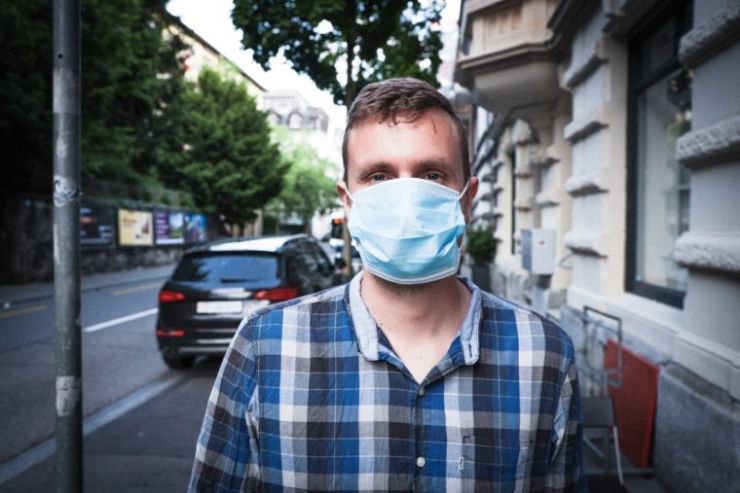
Lately, there has been a great deal of talk about resurrection and rebirth. The idea is that this present virus will teach us to become stronger and more able to cope with life's vicissitudes, whatever these turn out to be in the future, whilst bringing us closer together.
This idea is encapsulated in the 3,000-year-old Jewish custom of 'counting of the Omer', which starts on the second night of Pesach, straight after the second Seder meal in diaspora.
This custom comes from the injunction stated in Leviticus 23:15, to the children of Israel: 'You shall count ... from the day that you brought the omer as a wave offering.'
The omer was a measure of barley (approximately two quarts) that the children of Israel brought as the mincha or afternoon offering on the second day of Pesach. This was followed by the counting of the Omer every day for seven weeks - 49 in total - leading up to the festival of Shavuot on the 50th day, which celebrates the receiving of the Torah at Sinai, and is also a time of night and day study.
But why do we count the Omer? Because the reading every night is different, and takes us from an ideal view of love desired by recently-liberated slaves to a state of dignified nobility seven weeks later. This goal of self-purification involves 49 steps, or stations. Just as a child will ideally learn lessons at school which gradually increase in difficulty, so the freed slaves needed to take things very slowly at first.
It seems that the ideal of love is regarded as easier to digest by the average person than the practical work involved in carrying out loving actions on earth, which is what the final stage of sovereignty is all about.
It is often difficult to realise that the spiritual state of the children of Israel had sunk very low during their time in Egypt - understandably so, given their treatment by Pharaoh and his fellow Egyptians. So, receiving the Torah at Sinai would be far too difficult for the individual to take in straight away and this is why staging is such an important task.
As we are also currently commemorating Israel's Memorial Day to the victims of the Shoah, an analogy from that time might be in order.
When the allied soldiers first entered death camps such as Bergen Belsen after the War in order to liberate the skeletal Jewish prisoners, the soldiers, thinking that they were doing the right thing, gave them quite a lot of food to eat, including chocolate.
The liberators thought that chocolate would be a nice treat that the incarcerated victims of the Nazis might fancy after their ordeal - starved as they had been, often for years. Unfortunately, however, the stomachs of the imprisoned inmates had shrunk to such an extent that many of them died of a surfeit of inappropriate food.
I have heard eyewitness reports from people living near me, now in their 90s, who managed to survive the aftermath of their time at Bergen Belsen, Auschwitz or Buchenwald by simply refusing the chocolate offered (and really craved), because a part of them knew that their systems would not be able to cope.
So this is similar to what the children of Israel had to go through in order to ready themselves to accept the Torah at Sinai. Patiently, day by day, starting with the concept of ideal love and working on themselves until they reached a state of dignity and nobility, of sovereignty over themselves, this is what the 49 steps mean to the Jewish people. As soon as we have finished re-enacting in our own homes the Exodus from Egypt, we begin a process whose crown is the reception of the Torah at Sinai seven weeks later.
But crown doesn't mean being the 'master'; it means learning how to serve G-d, a much more difficult process.
The emphasis in Judaism is on 'learning'; that is, the study of biblical texts in Hebrew, together with commentaries and practices spanning over 2,000 years in order to carry on the Jewish religion with understanding through changing circumstances.
And learn we must during this Covid period. While this country's oldest Jewish newspaper (which incidentally did not cater for a religious readership) has folded, the strictly Orthodox press has changed beyond recognition, now embracing green issues, encouraging the use of the internet for learning and social purposes and, most of all, reiterating that the synagogue is simply a building, and that home is the main place from which Torah ensues into the world.
In fact the Hebrew word for 'home' is Bayit, which is also the term for 'temple'!
Many of us did not need to be reminded of this. One only has to encounter the so-called 'cathedral synagogues' all over the world to realize that Judaism is better than mere edifices. It is people who constitute the religion - you can pray in a field or a park just as meaningfully, or even more so, than in an enclosed space of bricks and mortar.
So this is why I can truthfully state that the recent Pesach Seder I conducted on my own from my kitchen table was the most meaningful in my whole life. Perhaps the Archbishop of Canterbury felt similarly when he delivered his Easter sermon from his kitchen table.
Before Pesach Seder, my grandchildren were in contact on Zoom from northern Israel and we sang some of the Pesach songs together, and my younger daughter also joined in from Jerusalem to go through the first days of
the Omer once the festival had finished.
My wonderful neighbour, Nigel, was the one who had helped me to acquire a smartphone in early February, which has allowed me to abreast with the spread of the virus worldwide, even taking precautions before this was the norm here in the UK. To be honest, some of my synagogue friends laughed at me for being overly concerned, but I was only following what had already been laid down in Israel for people of my age, news of which was coming in via the smartphone every second of the day.
And also because of Nigel, I was able to connect with my children and grandchildren, living in Israel, as well as other friends, one of whom - aged 90 - managed to What's App me herself from Jerusalem for the first time, just before the onset of Pesach.
I would love to be able to thank Nigel for all that he has done for me, for this neighbourhood, for a number of Jewish communities around the country and for the wider world. Unfortunately, however, I am unable to do this, because Nigel, aged 55, died of coronavirus on 14 April on the ward of one of our supposedly better hospitals situated here in Salford, Greater Manchester.
I was informed of Nigel's death by another neighbour just before the end of the festival, too late to inform my children in Israel, given the time difference between the two countries.
When I told my younger daughter, who knew Nigel quite well, she asked, 'Why? Why could this happen to such a young, beautiful person?'
Why indeed. Especially as we have now reached Israel's own commemorative day of Yom Ha-Shoah (the Day of the Shoah).
Why terrible things happen to wonderful people with their entire lives in front of them is a conundrum that we simply don't understand. And no doubt, once this virus is contained, hard questions will have to be asked of those in charge.
But, let me finish with Monday's Omer counting, known as 'Compassion in Discipline', which we read for the 10th day of the Omer and which I believe is a particularly fitting reminder for this time:
'Compassion is unconditional love. It is love just for the sake of love, not considering the other's position. Compassion is a result of total selflessness in the eyes of G-d. You love for no reason; you love because you are a reflection of
G-d.'
Just think of the change we would see in the world if we all heeded these words a little more once we come through this pandemic. Isn't it wonderful that no matter what situation we are in, there are lessons to be learned - if we are ready to receive them.
Dr Irene Lancaster is a Jewish academic, author and translator who has established university courses on Jewish history, Jewish studies and the Hebrew Bible. She trained as a teacher in modern Languages and Religious Education.



